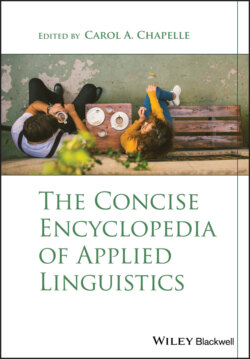Читать книгу The Concise Encyclopedia of Applied Linguistics - Carol A. Chapelle - Страница 34
The African Union and Prospects for the Indigenous African Languages
ОглавлениеThis final section explores the prospects for the indigenous African languages in education and other higher domains in the light of the AU's language policy declarations discussed previously. It argues that the cognitive advantages of mother tongue education cannot serve as the sole catalyst for promoting indigenous languages as the medium of instruction. Any attempt to promote the indigenous African languages in education must be made against an understanding of why there is such a high demand, whether genuine or artificially created, for former colonial languages in education and other domains. The use of former colonial languages in education is sustained mostly by the socioeconomic value with which these languages are associated. It is not an accident that English, for instance, is spreading around the world, and that many countries, including those with no colonial ties to Britain or the USA, are aggressively promoting the use of English in their educational systems. For instance, Tollefson (2002) reports that the governments of capitalist Korea and socialist Vietnam, and one must add communist China to this list, are taking serious steps to increase and improve English‐language education as part of broad economic development programs. In Africa, former French, Spanish, and Portuguese colonies are also aggressively promoting English by making the language a compulsory subject in their educational systems. Tollefson (2002) points out that the emphasis on English in these and other countries around the world comes with an implicit promise—that dedicating vast resources to the spread of English will yield concrete economic benefits.
The literature increasingly recognizes the importance of the relationship between language use and material outcomes in the success or failure of language policies (Paulston, 1988; Le Page, 1997; Nettle & Romaine, 2000). For instance, Paulston (1988) remarks that language planning efforts are most likely to be successful if they are supported by economic advantage or similar social incentives for the minority groups. Likewise, Nettle and Romaine (2000) note that true development of a political, economic, or social nature cannot take place unless there is also development of a linguistic nature.
If the African Union is genuinely keen to promote the indigenous languages, it must require its member states to formulate language policies that take into account the relationship between the indigenous languages and the economy and vest these languages with at least some of the privileges and perquisites that are currently the preserve of excolonial languages. It is only through the adoption and implementation of such policies that the majority of Africa's population will be able to access functional literacy in the indigenous languages and thus participate in the social, political, and economic development of the continent. As Fardon and Furniss (1994, p. 24) say, “the dialogue between the different discourses on language can be productive to the extent that each can identify with the aims of the others in favor of a broadly conceived program to empower languages users.” As long as the ruling African elite do not consider the promotion of the indigenous languages as an integral part of Africa's economic development program, and until these languages facilitate access to the wider society and economic advancement, their prospects will remain bleak, much as they have been throughout the past centuries.
SEE ALSO: Language and Globalization; Language and Identity; Linguistic Imperialism; Role of Linguistic Human Rights in Language Policy and Planning
